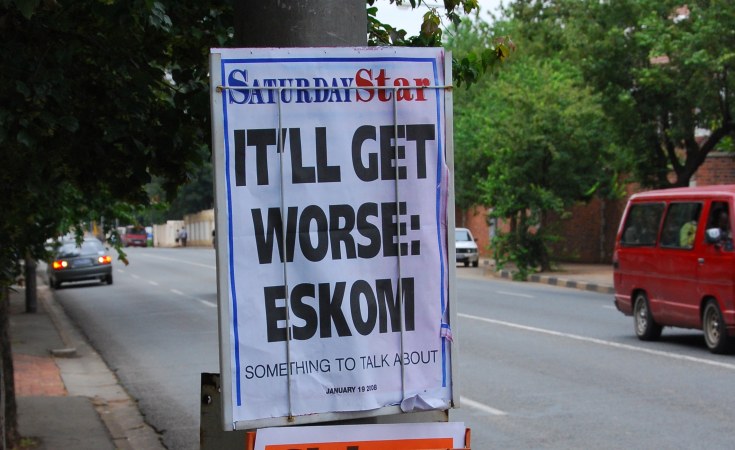South Africa is in the middle of a deep electricity crisis. In 2023 the public, many of whom are voters, experienced the worst loadshedding to date, losing power for an average of five hours a day.
The power shortages were largely due to excessive breakdowns in the country's coal power plant fleet, which generates over 80% of South Africa's electricity, combined with delays in developing new generation capacity.
The power crisis is a key election topic with national elections scheduled for 29 May. The ruling African National Congress (ANC) is tipped to lose its absolute majority in parliament. One reason for the ANC's drop in support is that it did not act on early warnings that electricity supply would drop to critical levels. In recent times, the ANC led government tried to fix this by removing constraints to private electricity generation and appointing a dedicated electricity minister. But the situation had deteriorated beyond the point where these steps could fix the problem.
As a physicist who has written widely on loadshedding and renewable energy, I predict that - given the ANC government's failure to end the energy crisis - opposition parties' fortunes will be boosted on election day if they offer credible and effective alternatives to loadshedding. However, despite confident sounding sales pitches, there are neither quick nor cheap solutions, which are what the public is looking for.
Do the political parties prioritise electricity?
In the last general elections in 2019, the three parties that received the highest number of votes devoted an average of just 2% (measured in pages) of their election manifestos to electricity. These were the ANC, Democratic Alliance (DA) and Economic Freedom Fighters (EFF). In the current election campaign, the major parties have devoted up to 10% of their manifesto to this topic. They have covered the topics of electricity and incentive mechanisms, potential business or job generation spin-offs, and possible devolution and private investment options.
However, none have put time frames to their electricity proposals. What is also largely missing from the manifestos is an evaluation of the costs of rolling out new forms of energy, which could lead to budget cuts in other areas like health and policing. There is also little indication that parties favour certain types of energy based on their cost and affordability.
Privatisation vs nationalisation
This is a key theme of the manifestos. The DA and other parties that present themselves as "pro-business", such as Action South Africa and Build One South Africa, believe that large scale privatisation of electricity will automatically lead to the end of power cuts. Their argument amounts to an ideological view that free market systems are more effective than state monopolies.
The EFF is a firm advocate of nationalisation and wants to terminate existing contracts with private power producers. It proposes repairing coal-fired power plants and keeping them going for longer. But fixing some plants might be prohibitively expensive.
Read more: South Africa's new plan to end power cuts is seriously flawed. Here's why
Many parties favour unbundling the monopoly enjoyed by the national electricity utility, Eskom, and devolving the electricity sector into smaller entities. This has already been initiated with the recent passing of the Electricity Regulation Amendment Bill, though some parties would like to stimulate competitiveness further.
This includes allowing municipalities more room to drive their own electricity generation. In its manifesto, the DA is canvassing on the basis of projects already initiated in municipalities that they govern - for example, Cape Town, where in line with international trends energy is fed into the grid by privately owned solar systems.
Renew(able) or not?
The country's president, Cyril Ramaphosa, and some advisory bodies have been quite enthusiastic about a boom in wind and solar energy. But Gwede Mantashe, the minister responsible for energy planning, has been a vocal promoter of coal, gas and nuclear power, while sounding sceptical of renewables. This standpoint is also reflected in his recently released and much criticised draft Integrated Resource Plan for electricity.
The ANC election manifesto is most closely aligned with the presidential vision. It highlights industrial growth and job opportunities linked to renewable power, such as developing a green hydrogen sector. There is only one short entry that states that the ruling party intends to "develop gas, nuclear and hydro power projects".
A smaller party that has its base in the Western Cape province, where solar and wind conditions are also favourable, is GOOD. Along with the DA, it favours the idea that new generating capacity should mainly come from wind and solar.
Read more: South Africa's power crisis: five essential reads
While promoting a "mix" of energy sources, the EFF sees coal and nuclear as "core" energy generating technologies. Its very long manifesto goes as far as saying that the nuclear plant construction should be established in co-operation with Russia. This is a provocative position to take, given that former South African president Jacob Zuma made a failed bid when he was in office for a massive new nuclear build by Russia.
Another controversial technology specifically advocated by the EFF is so-called "clean" coal. This is produced when relatively costly technological improvements are made to a power plant that would partly lower, but not eliminate, carbon emissions.
What do the parties agree on?
All the parties whose manifestos I examined agree that small scale domestic solar rooftop installations should be further promoted by the government. This followed a massive boom in 2023 that prevented even more extensive power cuts. Incentives to achieve this include subsidies, tax breaks and the opportunity for income generation through selling back excess electricity to the utility.
If a coalition government takes power after the elections, the route out of the electricity crisis could remain contested. This will hamper speedy progress on larger new builds. However, the intensified rollout of domestic solar installations enjoys support across the board. This is perhaps where progress will be fastest.
Hartmut Winkler, Professor of Physics, University of Johannesburg


